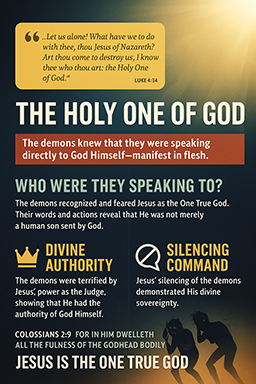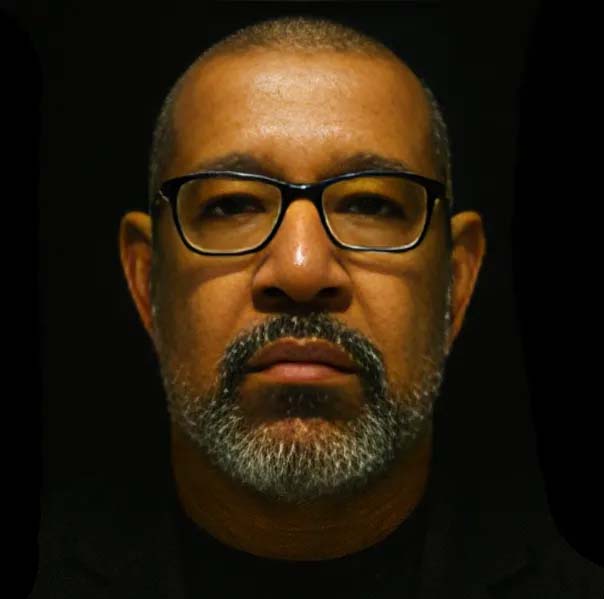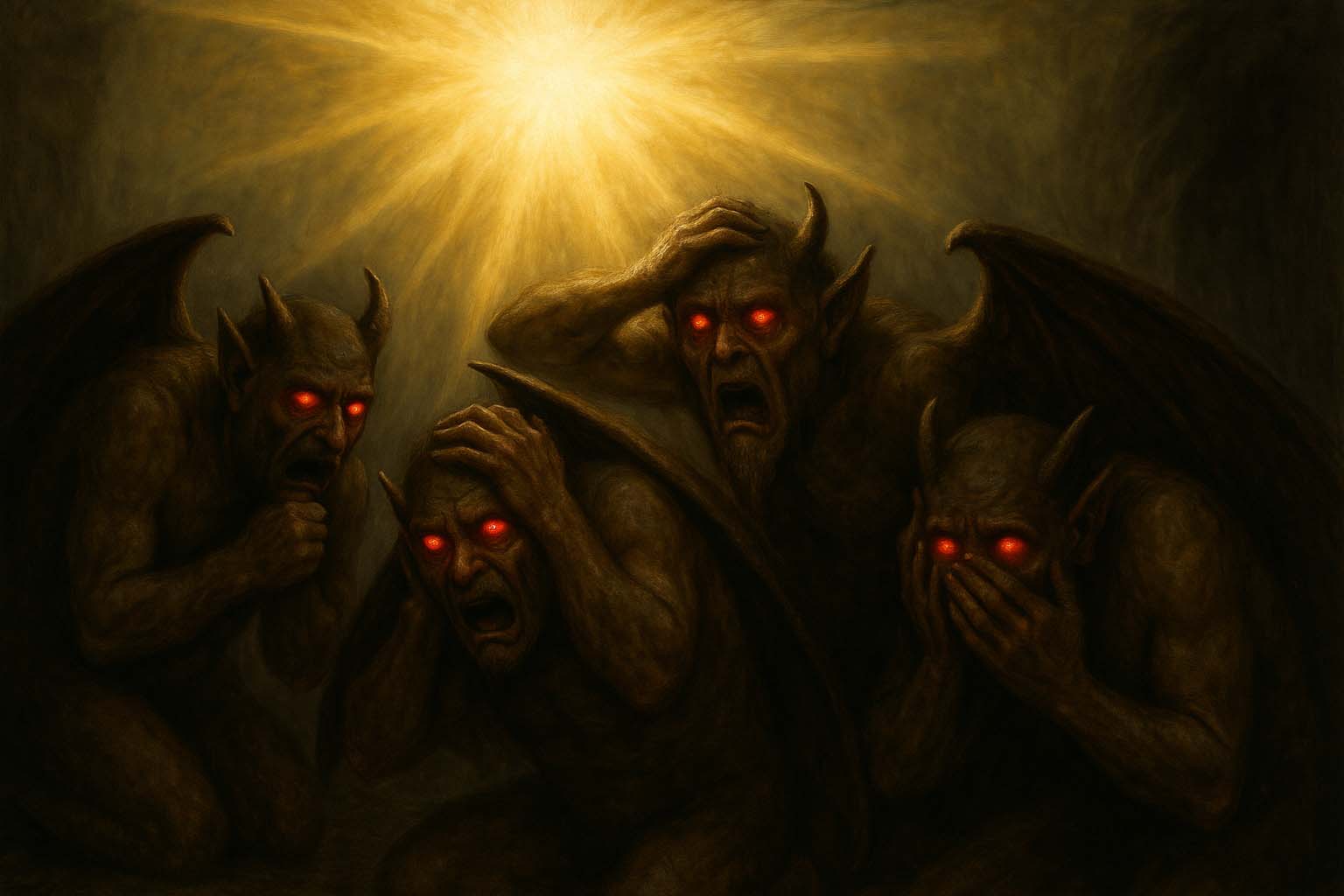When Jesus confronted demon-possessed individuals during His earthly ministry, the spirits inside them often reacted with terror and recognition. One striking example is found in Luke 4:34, where a demon cries out, "Let us alone! What have we to do with thee, thou Jesus of Nazareth? Art thou come to destroy us? I know thee who thou art: the Holy One of God." Similar scenes unfold in Matthew 8:29 and Mark 1:24. The question often arises: did these demons truly know who they were speaking to? Were they speaking to God Himself—or just someone sent by God?
On the surface, the demons addressed Jesus with titles like "Son of God" and "Holy One of God," which might seem to suggest a distinction between Jesus and God. But a closer look reveals something far more profound: these spirits were indeed speaking directly to God Himself—manifest in flesh. Their words, fear, and submission all confirm this fact. Even the act of Jesus silencing them ties directly into His divine authority and the timing of His self-revelation.
Who Were They Speaking To?
In every demonic encounter recorded in the Gospels, the evil spirits show a clear awareness of Jesus' identity. They speak not as if confused or unsure—but with dread and certainty. In Luke 4:34, the demon interrupts the synagogue teaching to scream out, "Art thou come to destroy us? I know thee who thou art: the Holy One of God." Similarly, in Matthew 8:29, a legion of demons begs Him, "Art thou come hither to torment us before the time?"
These aren't vague religious expressions—they are statements of absolute fear. The demons were terrified of Jesus, not merely because He was a prophet or healer, but because He carried the power and authority of final judgment. Only one Being has the authority to destroy spiritual beings and torment them eternally: God Himself. That's what makes these encounters so revealing.
Demons Fear Only One Judge
Consider this: no demon ever begged a prophet for mercy. They didn't tremble before Elijah, Moses, or even the apostles—though they acknowledged them as servants of power. In Acts 19:15, a demon says, "Jesus I know, and Paul I know; but who are ye?" Even then, the fear belongs only to Jesus.
But in Jesus' presence, they panic. Why? Because they understood they were standing before the one who had power over their destiny. Revelation 20:10 tells us the devil and his angels will be cast into the lake of fire—by the judgment of God. These demons feared that this was already beginning. Their plea "before the time" (Matt. 8:29) shows that they knew the timeline—and recognized the authority that could execute it.
This fear proves they were speaking not to a prophet, angel, or mere representative—but to the Judge of all spirits: God Himself.
Why Then Call Him "Son of God" or "Holy One of God"?
This is the nuance: although the demons were speaking to God, they referred to Him according to the title He had revealed at that time—"Son of God" and "Holy One of God." These are not lesser identities but revealed titles pointing to the same divine Being.
"Son of God" is often misunderstood today as suggesting a second divine person. But in the Bible, especially in the Gospels, it refers to God's visible, manifested role in flesh. John 1:14 says, "And the Word was made flesh," and Hebrews 1:3 declares the Son is "the brightness of his glory, and the express image of his person." So the "Son of God" is not another God—but God revealed in a specific form.
Similarly, "the Holy One of God" is a messianic title derived from Psalm 16:10—"Thou wilt not suffer thine Holy One to see corruption." Peter later affirms in Acts 2 that this refers directly to Jesus. So when the demons called Him the Holy One of God, they weren't wrong—but they were using the language of His earthly manifestation, not His eternal identity.
Their Actions Speak Louder Than Their Titles
Even if we debate how "Son of God" is to be interpreted, the actions of the demons remove all doubt. They begged. They trembled. They submitted. They asked for mercy. They obeyed without hesitation when rebuked. These are not things evil spirits do before just any man—not even a great man. They did this only because they knew Jesus was the One who had the power to command, torment, and ultimately judge them.
James 2:19 sums it up clearly: "The devils also believe, and tremble." They didn't just believe Jesus existed—they knew exactly who He was.
Why Did Jesus Tell Them to Be Silent?
This adds another layer to the argument. In Mark 1:25, after a demon calls Jesus "the Holy One of God," Jesus doesn't celebrate the confession. He commands, "Hold thy peace, and come out of him." Why silence them, especially when they were telling the truth?
Here's why:
1. It Was Not Time Yet
Jesus operated on a divine timetable. In John 7:6, He says, "My time is not yet come." The full revelation of His identity would unfold gradually, not through premature demonic proclamations.
2. God Doesn't Need Satan to Testify for Him
Even if demons speak truth, their source is polluted. Jesus did not need nor accept validation from fallen spirits. Their "confession" was neither righteous nor welcomed—it was an intrusion.
3. Jesus Controlled His Own Revelation
He silenced them to show that He—not they—controlled when and how His identity would be revealed. This reinforces His authority. Not even the truth may be spoken unless the Lord allows it.
In every way, His silencing of the demons further proves His divinity. Who else commands spirits with a word and tells them when they may speak?
Were They Speaking to God?
Yes. Though the demons used the terms "Son of God" and "Holy One of God," they were ultimately addressing God in the flesh. They knew it. Their words revealed awareness. Their actions revealed terror. And their obedience revealed submission to divine power.
It wasn't merely what they said—it was how they acted, and to whom they submitted, that proves the truth.
Colossians 2:9 makes it crystal clear: "For in him dwelleth all the fulness of the Godhead bodily." The demons weren't confused. They weren't merely guessing. They were standing before the same divine presence that had cast them from heaven—and they knew it.
Conclusion
The demons who cried out during Jesus' ministry weren't mistaken or reverent—they were terrified. They knew who He was. Though they used earthly titles like "Holy One of God," their behavior betrayed the truth: they were speaking directly to the One who has authority over hell and the abyss—the God of eternity clothed in flesh.
Their panic, pleading, and obedience prove it beyond argument. And when Jesus told them to be silent, it was not to deny His identity, but to assert His authority. Even the truth must bow to the timing and control of the Most High.
In the end, the demons feared what many still deny: God was among them, and His name was Jesus.


